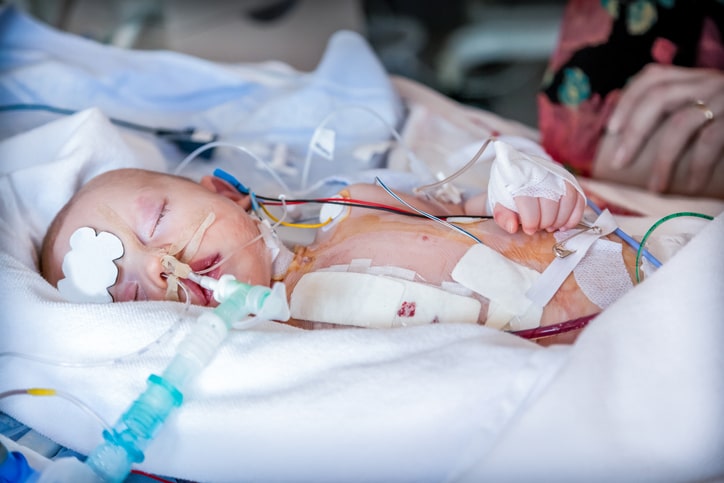Experienced Hypoxia Birth Injury Lawyers in Grand Rapid, Michigan

Has your baby suffered a brain injury caused by low levels of oxygen? Our experienced medical malpractice/birth injury lawyers have helped many families get the compensation they need to properly take care of their baby - and ensure their baby is cared for later in life. Let's look at when hypoxic injuries may be caused by medical negligence and how we can help.
What is Hypoxia?

Our organs, tissues, and cells need oxygen to function properly. "Hypoxia" means that the levels of oxygen being delivered to cells, tissues and organs is not sufficient for them to function properly. This is either because there is not enough blood being delivered or the blood being delivered does not have enough oxygen in it.
"Hypoxia" is also called "low oxygen" or "oxygen deprivation." "Anoxia" means that there is a total loss of oxygen to tissue, such as seen with a complete placental abruption.
What is a Hypoxic Injury?
What Causes Hypoxia?
There are multiple conditions that can result in decreased oxygenation in a fetus or newborn. Here are the ones that our birth injury attorneys see most often:
- Failure to tolerate labor: Sometimes, babies have trouble tolerating labor and delivery. There may not be an identifiable reason - the baby just can't handle the stress. This may manifest as the passage of meconium or changes in the fetal heart rate pattern.
- Placental abruption: This is a mechanical separation of the placenta from the uterine wall that prevents the baby's blood from being oxygenated.
- Cord compression: If the cord is compressed either from cord prolapse or from the baby's own body, less blood is transported through the cord.
- Uterine rupture: When the uterus ruptures, the fetus is left without the protection of the uterus and amniotic fluid, which can cause the fetus's heart rate to slow down. That results in less oxygenated blood reaching the tissues.
Is Hypoxia Preventable?

Times of low oxygen to the baby may not be preventable. Abruptions, compression, and the failure to tolerate labor are complications of childbirth. However, healthcare providers must be vigilant. They know that these complications happen, so they need to be on alert. The goal is to recognize when something is going wrong and get oxygen to the baby before hypoxic injury results.
Should a Doctor, Nurse or Midwife Know If a Baby Has Low Oxygen?
Healthcare providers, including doctors, nurses and midwives, have tools to help them identify when a baby is not doing well during labor.
One of the most important tools is monitoring the fetal heart rate. Sometimes, in early labor, the baby's heart rate is only checked periodically. Closer to delivery, or if there are concerns, the heart rate may be continuously monitored. Changes in heart rate, such as bradycardia (low heart rate) or tachycardia (high heart rate) or decelerations, can be a sign that the fetus is in a hypoxic environment and is at risk for acidemia.
Healthcare providers also look at whether fetal movement is absent or the passage of meconium.
They also must be aware of risk factors such as maternal smoking or drug use, small placenta, low amniotic fluid, high maternal blood pressure / preeclampsia, low maternal blood pressure, maternal infection, maternal bleeding, fetal anatomical malformations, and fetal malposition (i.e., breech).
If healthcare providers aren't paying enough attention, they may miss risk factors, signs and symptoms of fetal hypoxia. This could cause an unreasonable delay in performing a C-section or failure to perform other interventions to increase oxygen to the baby.
Tests and Exams for Hypoxia
There are some general tests and monitoring for fetal well-being, such as fetal heart monitoring, biophysical profiles, and ultrasound exams. However, the effects of hypoxia usually cannot be determined until after the baby is born.
Here are some indications that a baby may have brain injury associated with hypoxia:
- Low Apgar scores
- Born limp
- Born without respiratory effort (i.e., not breathing at birth), slow breathing, or abnormally fast breathing
- Born pale or blue
- No heartbeat at birth
- Abnormal blood gases
- Lack of response to stimulation
- Brain injury visualized on imaging such as MRI
- Seizures / abnormal EEG
- Difficulty feeding
- Excessive fussiness
- No cry / weak cry
How is a Baby with Oxygen Deprivation Treated?

Unfortunately, brain death cannot be reversed. Most treatments are aimed at correcting acid/base imbalance, getting the baby's vital organs to work properly (i.e., heart beating at the right speed, breathing at the correct rate) and preventing further brain damage. The hope is that as the baby develops, he or she can fully compensate for any minimal brain injury and lead a fully normal, happy, healthy life.
Doctors must act very quickly once they realize the baby may suffer hypoxic injury. This includes:
- Emergent C-section delivery
- Intra-uterine resuscitation with fluids and position changes
- Medications such as atropine and epinephrine to stimulate heart beat
- Seizure medications such as phenobarbital, benzodiazepines, and lidocaine
- Administration of oxygen to the newborn by mask or intubation
- Hypothermic cooling
- IV Fluids and blood pressure medications
What is the Outlook, Prognosis, or Future for a Baby that Suffered Oxygen Deprivation at Birth?
The future health of the baby will depend on the extent of the brain injury. Some babies fully recover from hypoxia. Others have such severe brain damage that they cannot survive without life support after birth.
Most cases are somewhere in between. Children with HIE may have only mild learning difficulties or developmental delays. Other children may have movement difficulties, such as cerebral palsy, or be unable to see, hear or speak. As they grow, they may need a wheelchair or a walker. Modified vehicles and home modifications might be required.
When your child suffers a severe brain injury, it can be hard to keep a positive attitude when you know the damage is permanent. We learned a lot from the most positive mother we ever had the honor of representing. She threw all expectations she had for her daughter out the window and said that her job as the mom for this little girl was to ensure that her daughter had the most normal childhood she possibly could and to live her best life.
Common Medical Negligence Scenarios that Cause Hypoxic Brain Injury

Sadly, we keep seeing the same scenarios over and over again. Here are the most common birth negligence cases we see:
- Nurse or midwife doesn't recognize abnormal fetal heart tracing
- Nurse or midwife fails to call the doctor when the fetal heart tracing is concerning
- Doctor fails to timely perform a C-section
- Failure to continuously monitor the baby
- Failure to timely deliver after placental abruption or uterine rupture
- Failure to recognize that labor will not progress
- Mismanagement of Pitocin
- Failure to react to uterine tachysystole or fetal heart rate decelerations
Michigan Lawsuits For Brain Injury Caused by Oxygen Deprivation
If your child was severely injured by a cord compression that was negligently handled, you may be wondering, "How does a medical malpractice case work in Michigan?" We have put together a very detailed guide to Birth Injury Lawsuits in Michigan. But here is a brief overview of what you can expect in a Michigan medical malpractice lawsuit for a birth injury:
- Free initial case review: Every case starts with a free case review. You can complete our online form, email us, or call. We need a summary of what happened. We have been birth injury lawyers in Michigan for a long time, so sometimes we know right away if we will not be able to help you. If we think we might be able to help you, we will start investigating your case.
- Investigation: Our investigation starts by obtaining your and your baby's complete medical record. This includes prenatal records, hospital records, and any records of aftercare. Once we have reviewed the records, if we think there may be a case, we will send the records for review by an expert. If the expert is supportive, we will commence the lawsuit by sending a Notice of Intent or trying to settle the case pre-suit.
- Notice of Intent: Many states have enacted certain pre-suit requirements, including Michigan. In Michigan medical malpractice cases, we must send a "Notice of Intent" to every health care provider and facility that we intend to sue. This is nothing more than a summary of the basis of the lawsuit. Unfortunately, we must then wait 182 days until we actually file suit. (If you think this requirement is ridiculous, like we do, we encourage you to contact your local government representative.)
- Pre-suit Settlement: Based on our experience, we can generally identify cases that can be settled without filing a lawsuit. If we think your case is one of those, we will work directly with the hospital or insurance company to try to resolve your case without litigation.
- The Lawsuit: Litigation is a slow process. We file the medical malpractice complaint, then the defendants have time to file an answer. Those are called "pleadings." Next, we generally exchange written discovery, which is where we send questions back and forth and exchange documents. After that, months are spent in depositions. You and close family members are usually deposed first, then the defendants, than other fact witnesses, and then experts. "Motions," which is a fancy name for something filed with the court to ask the judge for a ruling, are filed both during and after discovery. A case can be settled any time, but the most common time is after depositions are done.
- Settlement or Trial: Most cases settle. This is particularly true with Hoffer & Sheremet because we vet our cases well. However, if a case cannot be settled for a reasonable amount, then we go to trial.
- Appeal: It will seem like trial should be the end of a case. But it's not. After trial, the losing side can appeal the verdict and any decision that the judge made in the case that could have affected the outcome. Appeals take years. And depending on the ruling, the appellate court may require that a new trial occur (after which there can be another appeal).

Your Family Deserves the Best Medical Malpractice Lawyers in Grand Rapid, Michigan
Your family deserves local Michigan lawyers that are familiar with our hospitals, insurance companies, defense attorneys and judges. Here is how our Michigan lawyers are the best for your child:
- Experienced Attorneys: Our team has extensive experience handling medical malpractice cases, particularly those involving birth injuries or serious injuries to children or parents.
- Expertise: We only practice malpractice law. We are experts in the law and the medicine.
- Personalized Attention: We only accept a few cases each year. This lets us treat each case with the attention and care it deserves, ensuring that you receive personalized support throughout the legal process.
- Proven Track Record as the Best Medical Malpractice Lawyers in Michigan: We have a history of successfully securing favorable outcomes for our clients, including significant settlements and verdicts. We are careful about the cases we take and have (we believe) the highest percentage recovery rate of any medical malpractice law firm in Michigan. In fact, in the history of our firm, we have only lost one case – every other case we have either settled or won at trial. We also have an exceptionally high rate of settling cases without even needing to file a lawsuit.
Start your medical malpractice case review

Don’t wait to get the justice you deserve. Contact us today for a free consultation. Our skilled attorneys are here to help you navigate the complexities of a medical malpractice claim and work tirelessly to achieve the best possible outcome for you and your family.